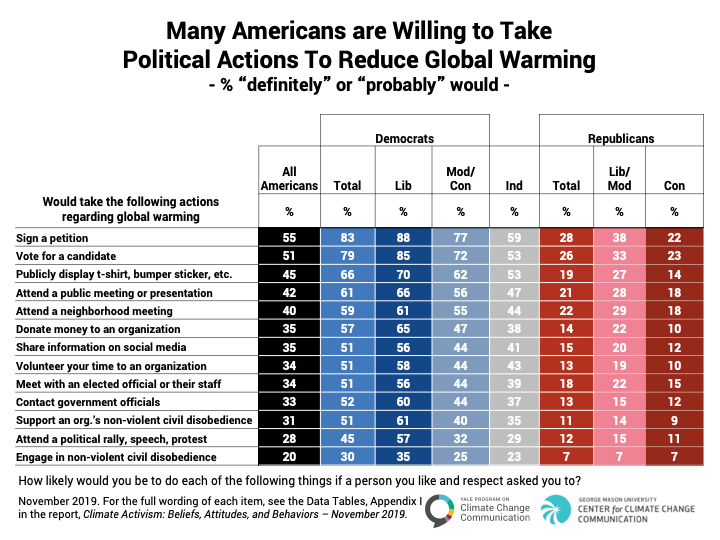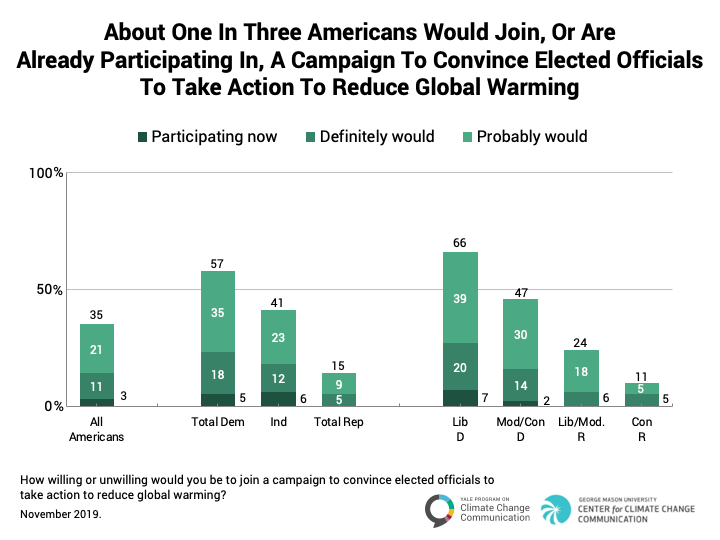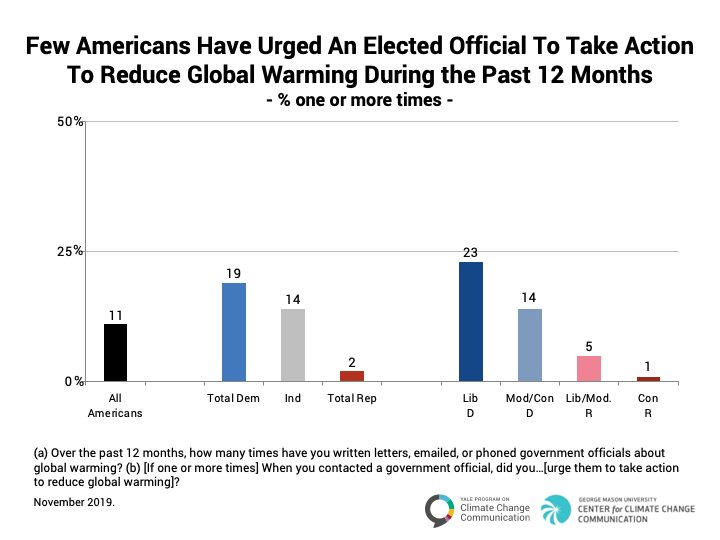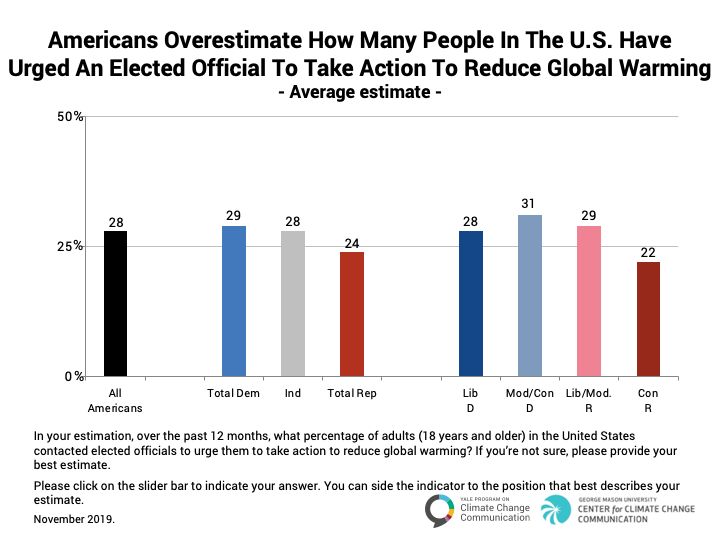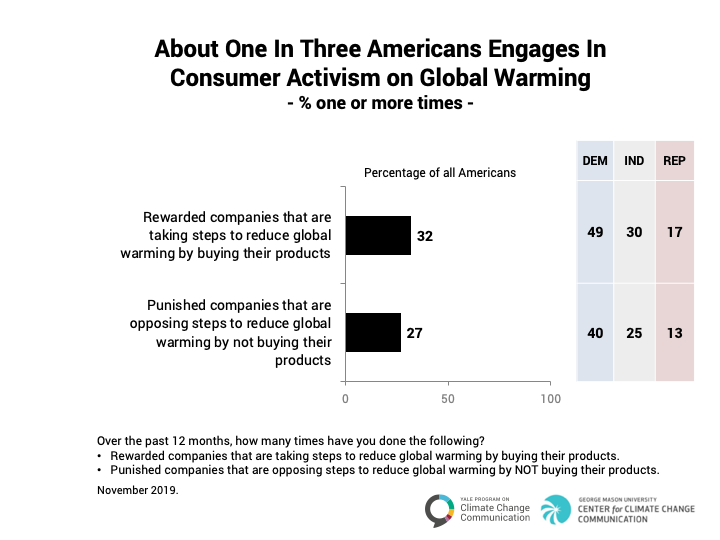Report · Feb 18, 2020
Climate Activism: Beliefs, Attitudes, and Behaviors – November 2019
By Anthony Leiserowitz, Edward Maibach, Seth Rosenthal, John Kotcher, Parrish Bergquist, Abel Gustafson, Matthew Ballew and Matthew Goldberg
Filed under: Behaviors & Actions, Beliefs & Attitudes and Policy & Politics
3. Individual and Collective Action to Reduce Global Warming
3.1. Many Americans are willing to take political actions to reduce global warming.
About half of Americans (51%) say they would vote for a candidate for public office because of the candidate’s position on global warming if a person they like and respect asked them to. This includes a large majority of Democrats (79%), and about half of Independents (53%), but only about one in four Republicans (26%).
A majority of Americans also say they would sign a petition about global warming (55%). Fewer would publicly wear a t-shirt or display a or bumper sticker (45%), share information on social media (35%), attend a public or neighborhood meeting (42% and 40%), volunteer time (34%) or donate money to an organization (35%).
Three in ten Americans say that, if asked by a person they liked and respected, they would meet with an elected official or their staff (34%) or contact government officials (33%) about global warming. Fewer Americans have actually taken these actions in the past year (see Sections 3.2 and 3.3), suggesting the potential to mobilize more Americans as climate change policy advocates through their social networks.
Three in ten Americans (31%) would support an organization engaging in non-violent civil disobedience against corporate or government activities that make global warming worse, and one in five (20%) say they would personally engage in non-violent civil disobedience.
Overall, Democrats are most likely to say they would take these actions, with a majority of liberal Democrats saying they would take all of the actions listed other than engaging in non-violent civil disobedience. Independents and Republicans are less likely to take these actions.
3.2. About one in three Americans would join, or are already participating in, a campaign to convince elected officials to take action to reduce global warming.
A total of about one in three Americans (35%) are either participating (3%), definitely would participate (11%), or probably would participate (21%) in a campaign to convince elected officials to take action to reduce global warming. This includes a majority of Democrats (57%; 66% of liberal Democrats and 47% of moderate/conservative Democrats), four in ten Independents (41%), and 15% of Republicans (24% of liberal/moderate Republicans and 11% of conservative Republicans).
The percentage of Americans who are participating or would participate in such a campaign has increased by 10 percentage points since our previous survey in April 2019, particularly among Democrats and Independents (both groups +15 percentage points). This is due primarily to an increase in the percentage of Americans who way they are willing to participate in a campaign rather than an increase in the percentage who are already participating in one.
3.3. Few Americans have urged an elected official to take action to reduce global warming during the past 12 months.
Only about one in nine Americans (11%) say they have contacted an elected official during the past 12 months to urge them to take action to reduce global warming. However, about one in five Democrats (19%), including 23% of liberal Democrats and 14% of moderate/conservative Democrats, say they have done so. Additionally, 14% of Independents, but only 2% of Republicans, have contacted an elected official to urge them to take action to reduce global warming.
3.4. Americans overestimate how many people in the U.S. have urged an elected official to take action to reduce global warming.
Although only 11% of adults in the U.S. have contacted an elected official over the past 12 months to urge them to take action to reduce global warming (see previous section), Americans, on average, think that more than one in four U.S. adults (28%) have done so. This overestimation applies across the political spectrum – conservative Republicans, whose average estimates are the most accurate, still think that twice as many Americans have contacted elected officials about global warming (22%) as have actually done so.
3.5. Many Americans think an increasing number of people in the U.S. are contacting elected officials about global warming.
Four in ten Americans (40%) think the percentage of adults in the U.S. who have contacted elected officials to urge them to take action to reduce global warming has increased over the past 12 months. About half of Americans (53%; see Data Tables, p. 28) think that percentage has stayed about the same. Few (6%) think it has decreased. Democrats (54%) – particularly liberal Democrats (61%; see Data Tables, p. 28) – are the most likely to think this form of activism has increased. This may be in part because liberal Democrats are also the group that has actually contacted elected officials about global warming the most over the past 12 months (see Section 3.3).
Similarly, 42% of Americans think that over the next 12 months, the percentage of adults who will contact elected officials to urge them to take action to reduce global warming will increase. About half (51%) think it will stay about the same, while only 5% think it will decrease. About six in ten Democrats (59%), including 66% of liberal Democrats (see Data Tables, p. 28), think the percentage will increase over the next 12 months.
3.6. About one in three Americans have engaged in consumer activism on global warming.
About one in three Americans (32%) have rewarded companies that are taking steps to reduce global warming by buying their products in the past 12 months, and about one in four (27%) have punished companies that are opposing steps to reduce global warming by not buying their products. Democrats are most likely to have engaged in these “buycotts” (49%) and “boycotts” (40%). Additionally, three in ten Independents (30%) have rewarded companies and one in four (25%) have punished companies. Fewer Republicans have taken either action.
